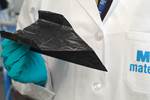Concentrated smooth dispersion simplifies electrical conductivity applications
CAMX 2024: Total Resin presents Total Nanotüp, a concentrated dispersion of carbon nanotubes in a bifunctional reactive monomer for polyester, vinyl ester, melamine and acrylic resins.
Total Resin (Naucalpan, Mexico) presents Total Nanotüp, a concentrated dispersion of carbon nanotubes (CNTs) contained in a high-performance bifunctional reactive monomer, recommended by the company for polyester, vinyl ester, melamine and acrylic resins.
Total Nanotüp dispersion is designed to provide optimal electrical conductivity to polyester resins (solvent-free and solvent-based), melamine (solvent-free and solvent-based) and acrylic systems while maintaining mechanical properties. It is a smooth paste dispersion, and is said to be efficiently mixable into resins.
Total Nanotüp is a single-walled CNT additive that provides electrical conductivity at low doses with minimal impact on rheological properties, which can grant customers the benefits and performance of CNTs. It is also said to minimize reformulations and accelerate product innovation.
Possible applications include:
- Antistatic property
- SMC/BMC processes, RTM, hand lamination, spray lamination and pultrusion processes
- Gelcoat coatings
- Resins for tooling
- Gelcoat tooling
- Antistatic tubes and tanks for fuels
- Electrostatic discharge materials applied by coil coating
- Other applications requiring electrical conductivity
According to the company, Total Nanotüp enables a dosage from 1 wt.%. It allows for simple dispersion and incorporation using common dilution equipment, and enables the production of conductive parts that retain intense colors. In addition to preserving and increasing mechanical strength, the dispersion technology achieves uniform and permanent electrical conductivity without “hot spots,” and optimizes surface quality, due to minimal dust attraction. There is no significant increase in material viscosity and density and demolding of parts is enhanced.
Depending on the characteristics of the polymer and processing conditions, the loading dose of Total Nanotüp dispersion for antistatic or dissipative applications can reach values of 1-13 wt.%. These calculations are made based on non-volatile material. The exact loading dose depends on the required performance, resin properties, processing conditions and the presence of other ingredients.
Related Content
-
Graphene-enhanced SMC boosts molded component properties
CAMX 2023: Commercially sold GrapheneBlack SMC from NanoXplore increases part strength, stiffness and provides other benefits for transportation, renewable energy, energy storage and industrial markets.
-
CAMX 2023 Attendee Survey
CAMX – The Composites and Advanced Materials Expo is right around the corner, and we want to better understand your hopes and expectations heading into the show. CompositesWorld asks you to answer one of the five questions in the survey below. Responses will remain anonymous, and some may be published in the CAMX Show Daily, which is distributed at the show. The survey will take less than 5 minutes to complete.
-
CAMX 2023 Show Daily: Thursday, Nov. 2
CW is reporting live on the CAMX show floor in Atlanta, Georgia. Download today’s Show Daily covering interesting exhibitors and technologies, the committee members and volunteers that make the show possible, “Good Day, CAMX” results and a look back at show floor activities.














